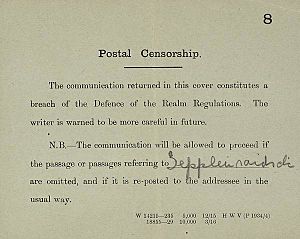Defence of the Realm Act 1914 facts for kids
| Act of Parliament | |

|
|
| Long title | An Act to confer on His Majesty in Council power to make Regulations during the present War for the Defence of the Realm. |
|---|---|
| Citation | 4 & 5 Geo. 5. c. 29 |
| Territorial extent | United Kingdom of Great Britain and Ireland |
| Dates | |
| Royal assent | 8 August 1914 |
| Commencement | 8 August 1914 |
| Other legislation | |
| Amended by |
|
| Repealed by | Defence of the Realm Consolidation Act 1914 |
|
Status: Repealed
|
|
| Text of statute as originally enacted | |
The Defence of the Realm Act (often called DORA) was a special law passed in the United Kingdom. It became law on 8 August 1914, just four days after the UK joined World War I. As the war went on, more parts were added to this law.
DORA gave the government a lot of power during the war. For example, it could take over buildings or land needed for the war effort. It could also create new rules that made certain actions against the law.
This act brought in many strict rules to control people's lives. One big change was censorship. This meant the government could stop people from saying or writing things that might make soldiers or civilians lose hope. For instance, it was against the law to "spread reports likely to cause disaffection or alarm." Some people who spoke out against the war, like John MacLean and Bertrand Russell, were sent to prison. Even a film called The Dop Doctor was banned in South Africa because it showed people in a way that might upset some groups.
Many everyday activities became illegal under DORA. You couldn't fly kites, start bonfires, or even buy binoculars. Feeding wild animals bread was also against the rules. People were not allowed to talk about naval or military matters in public. Pub opening times were also cut short, from 12pm to 3pm and 6:30pm to 9:30pm. Alcoholic drinks were even watered down!
After World War I, DORA was used to deal with problems in Ireland during the Irish War of Independence. A part of the law allowed military leaders to arrest Irish people without a formal charge or trial. This part of the law was finally removed in 1953.
Why DORA Was Created

Like many laws made during wartime, the Defence of the Realm Act was created for two main reasons. First, it aimed to help prevent a possible invasion of the UK. Second, it wanted to keep people's spirits high at home.
The act controlled what journalists could write and what people could say. Letters sent home from the front lines were also checked. Newspapers were not allowed to report on troop movements or numbers. They also couldn't share any other information that might help the Central Powers, who were the enemy. People who broke these rules, whether they meant to help the enemy or not, could face very serious punishments. In fact, 10 people were executed under these rules.
How DORA Changed Over Time
The original Defence of the Realm Act was passed in August 1914. It gave the government power to make rules for public safety and defence. These rules allowed for people to be tried by military courts if they broke them. This was especially true if they tried to communicate with the enemy or get information for them. It also covered actions that could put the success of the UK's forces at risk. The law also aimed to keep communication lines, railways, docks, and harbours safe.
The DORA law was changed and added to several times during World War I. It was updated in August 1914 and then again in November 1914. The November update replaced the earlier versions. More changes were made in 1915.
The updated law from November 1914 said that the government could make rules for public safety and defence. These rules covered many things. They could stop people from talking to the enemy or getting information that could hurt the war effort. They also made sure that the UK's forces, ships, and important places like railways and ports were safe. The law also aimed to stop false rumours or reports that could cause trouble or harm the war. It also helped control how ships moved to keep them safe. Finally, it aimed to stop anything that could help the enemy or make it harder to win the war.
The law also allowed the Admiralty (the navy's leaders) and the Army Council (the army's leaders) to take control of factories. They could demand all or part of what a factory produced, like weapons or equipment. They could even take over a factory completely to use it for the war.
Similar Laws in Other Countries
Many countries had similar laws during wartime to keep their nations safe. Here are a few examples:
| Time Period | Country | Law |
|---|---|---|
| World War I | War Precautions Act 1914 | |
| War Measures Act | ||
| Espionage Act of 1917; Sedition Act of 1918 | ||
| Post-WWI | Emergency Powers Act 1920 | |
| World War II | National Resources Mobilization Act | |
| Emergency Powers Act 1939 | ||
| Emergency Powers (Defence) Act 1939 |
See also
 | Janet Taylor Pickett |
 | Synthia Saint James |
 | Howardena Pindell |
 | Faith Ringgold |

